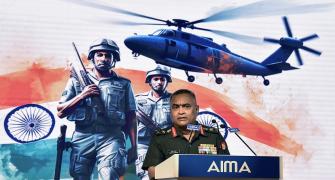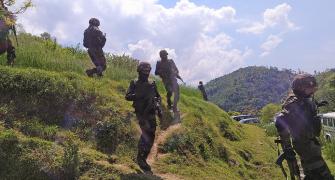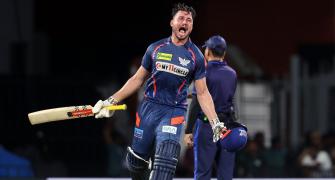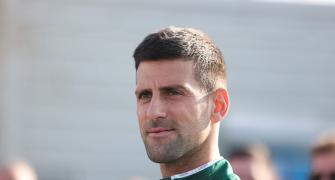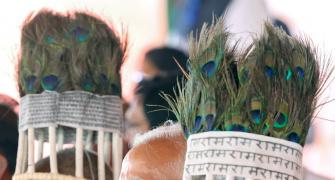Duncan Fletcher's impending exit prompts Haresh Pandya to suggest 'Indian' options for the job of national coach.

There may not be anything common or similar between John Wright, Greg Chappell, Gary Kirsten and Duncan Fletcher, including nationalities, playing styles and achievements as players, but a noticeable feature on their CVs that bracket them together is that each one of them was Team India’s coach in the new millennium.
To be precise, the national team has not had an Indian coach since its horrendous performance under Kapil Dev during his uninspiring tenure in 1999-2000.
With Fletcher’s lacklustre five-year innings having already come to an end after our World Cup semi-final loss, there is the possibility of an Indian coach taking charge of the country’s cricket caravan after 15 long years.
Already the winds of change are sweeping across the nation under the new BJP government, which sets so much store by the idea of swadeshi. And giving credence to the possibility are the names of the likes of Ravi Shastri, Sanjay Bangar, Rahul Dravid and Sourav Ganguly, which are being bandied about as likely contenders.
Shastri was 'Director of Cricket', the fancy label attached to the position specially created in Team India for the former all-rounder, for the past several months. His seemingly easy, friendly and pragmatic but, at times, stern approach was generally admired by all. His presence in the dressing room, as well as dugout, had a strong bearing on the rejuvenation of Team India, which played well enough to reach the semi-finals of the World Cup after being humiliated in the Test and triangular One-day series Down Under that preceded the ICC’s 50-overs' mega event.

In 2007, too, Shastri was appointed coach-cum-manager on an interim basis for the tour of Bangladesh in place of Chappell, who resigned in a huff in the wake of Team India’s disastrous performance and early elimination from the World Cup in the West Indies.
Many believe that the former India all-rounder, who commands greater respect for his cricketing wisdom and experience, could be an ideal man for the job. If he can manage, frees himself from his media commitments and continues to show a keen interest in working with Team India, the BCCI’s task may be a lot easier.
Bangar, the only Indian who is a head coach in the eight-team IPL, where rest are foreigners, is another former India player with all the right credentials to take Fletcher’s place. He may not have achieved much as a player, but few can match him when it comes to technical knowledge, mind games and man-management.
In the IPL and with Team India (as an assistant coach since August 2014), Bangar, who believes in the philosophy of action speaking louder than words, has demonstrated these qualities with good if not spectacular results.
He was said to be more popular with the Indian players than Fletcher and it may not be a bad idea if the BCCI considers promoting him.
Given their vast experience, Dravid and Ganguly may as well have a good chance of becoming Team India’s next coach. However, both are likely to be part of the BCCI’s committee that will decide on the appointment of Team India’s coach and other support staff. If so, at least technically, they do not, or cannot, qualify for the job.
All this, of course, is in the realm of conjecture only and there’s nothing official about it. Not yet. Nor is it confirmed whether India is looking for a swadeshi or foreign coach. But, as is its wont, the BCCI will keep its fingers crossed while keeping all doors open for both the Indian and foreign candidates for the much-anticipated high-profile post.

Former players and coaches like Ajit Wadekar and Aunshuman Gaekwad, as well as Dilip Vengsarkar and Kiran More and others of their ilk, are in favour of having an Indian coach. Their line of argument is that an Indian coach knows the culture well and has a fair idea of various problems the players face on and off the field. He is a far better communicator than a foreigner, especially for those players who speak only Hindi, they argue.
‘Whether he is Indian or foreigner, the coach has to be good at his job. In the past, we used to have Indian coaches. And then came a series of foreign coaches,’ says More. ‘So I don’t see any reason why we can’t have an Indian coach again provided the man is well-qualified for the job.’
While the BCCI has a number of experienced Indian players to choose from, many foreign cricketers-turned-coaches, including those having jobs with IPL franchises, are also bound to apply for the position of the national team’s head coach. But IPL experience means nothing at all, to say the least. The job requires you to master all the three formats – Tests, One-Day Internationals and Twenty20s. Not only that, the new coach will have to work with two captains, Mahendra Singh Dhoni and Virat Kohli, who are as different as chalk and cheese, both in approach and temperament, in different versions of the game at the international level. This in itself will call for much more than mere knowledge of the game.
A former player requesting anonymity told Rediff.com that “the BCCI should tread carefully” when it comes to appointing the Team India coach.
‘It doesn’t matter whether he is an Indian or a foreigner, so long as the BCCI appoints the right man,’ he said.
‘All I’d like to say is that don’t go by the coach’s reputation as a player. He may be a great player, but does he have it in him to be a great coach also? In fact, reputations can have adverse effect sometimes.
‘What happened when Chappell was India’s coach? He had an ego the size of an ostrich’s egg and he ruined a couple of careers, including Ganguly’s.
‘Wright wasn’t a towering player, but he turned out to be an excellent coach, winning everyone’s admiration, love and respect and producing desired or expected results, too.’

Talking about egos and reputations, they often come in the way, particularly when you feel that you are superior with super achievements than the players you are dealing with and guiding; more so when the team’s captain also has a giant ego. If Ganguly is going to be India’s next coach, for instance, he will be better off shedding his famous ego and come down to the level of his wards.
Gaekwad, who was Team India’s coach from 1997 to 1999, once asked me rhetorically during a freewheeling conversation whether we really need the head coach.
‘You’ve got a batting coach, a bowling coach, a fielding coach, a physio, a video analyst, a team manager, a media manager and several other supporting arms. When you have so many coaches and other such personnel, what or where is the need for the head coach? What is he there for?’
Maybe, the former India opener, who had only the team manager to look after everything when he played for the country in the 1970s and 1980s, was echoing the feelings of many.
Perhaps the cash-rich BCCI, which can afford all these luxuries, should shed some light on these points.
Meanwhile, the bookies are going to have a great time till the appointment of Team India’s new coach -- Indian or foreigner!



